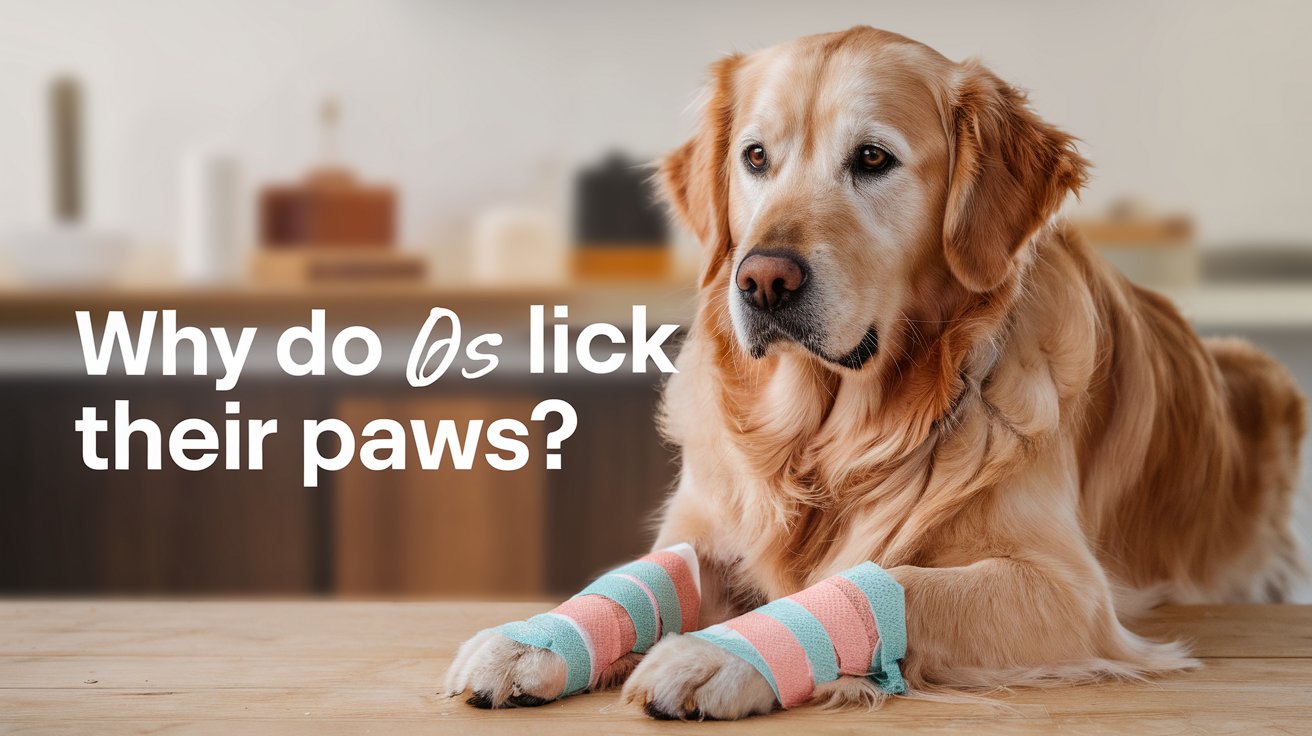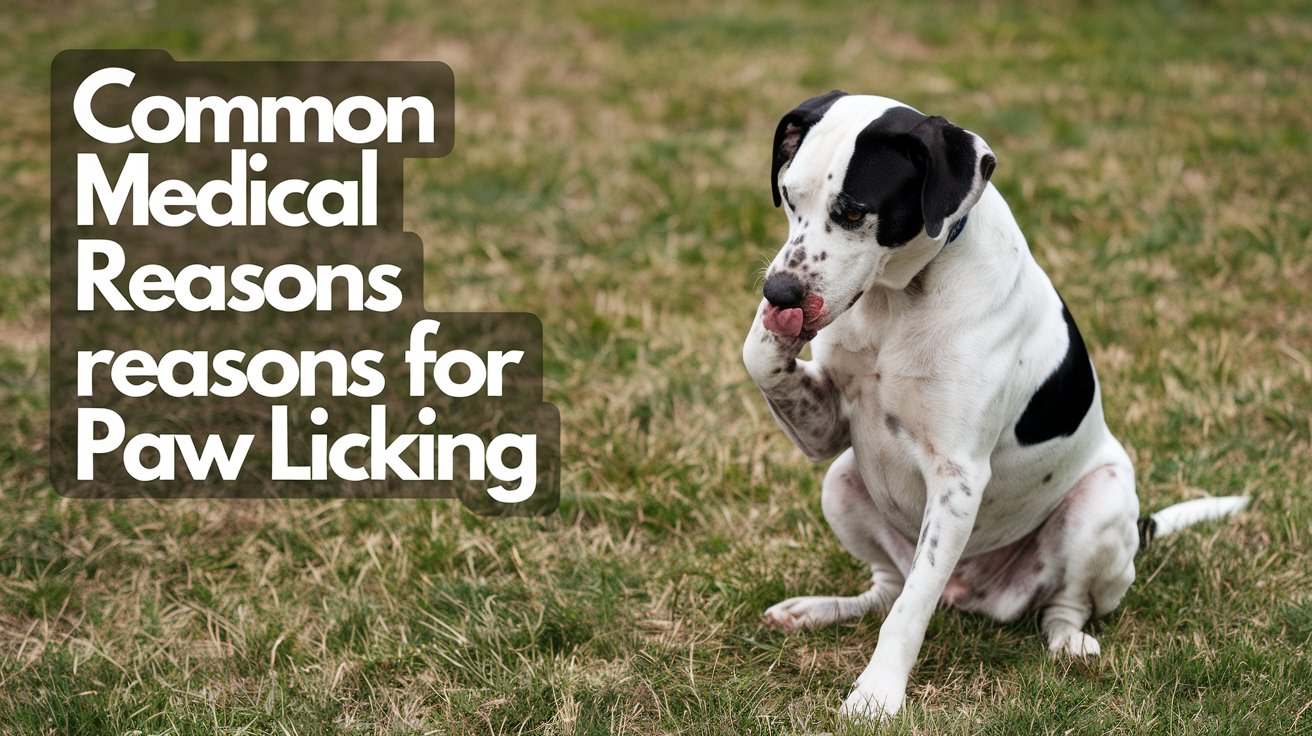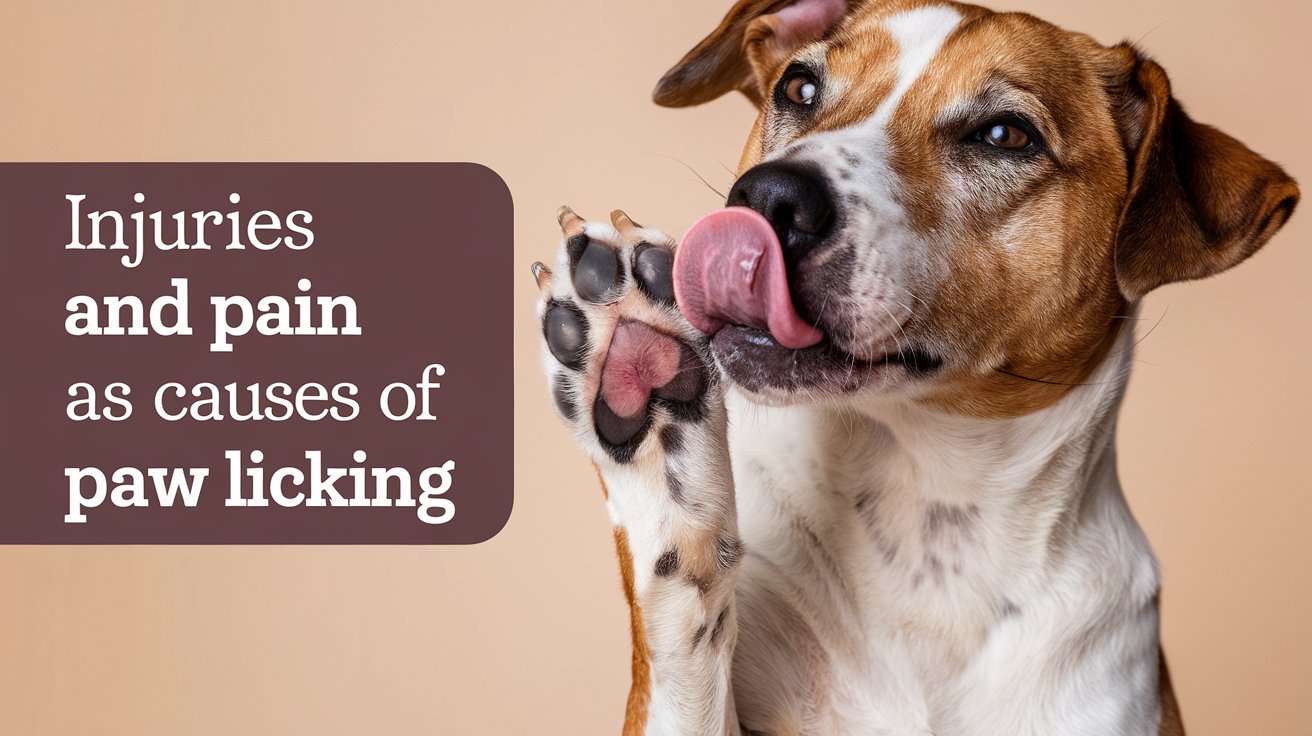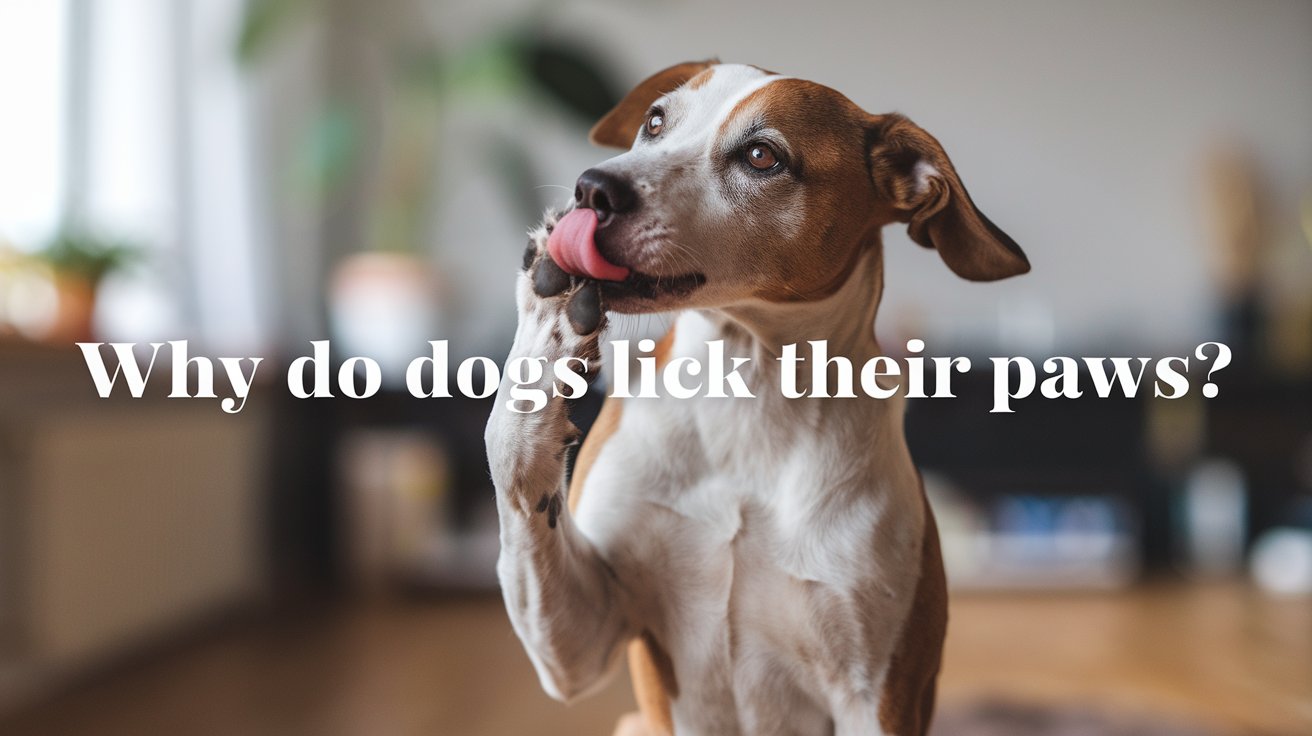
Why Do Dogs Lick Their Paws?
Normal Reasons for Dogs Licking Their Paws
Grooming Habits
Like cats, dogs often lick their paws in their regular grooming routine. Dogs are naturally inclined to keep their paws clean, especially after a walk or playing outside. If your dog is licking its paws occasionally, it’s likely just maintaining good hygiene.
Exploring Their Environment
Dogs use their paws and mouths to explore their surroundings. After walking through grass, mud, or unfamiliar terrain, dogs might lick their paws to clean off any residues or foreign materials they’ve picked up.
Minor Irritations
Sometimes, dogs lick their paws to soothe minor irritations, like when something gets stuck between their toes, such as dirt, tiny stones, or grass seeds. Licking is their way of trying to remove the irritant and provide relief.

Common Medical Reasons for Paw Licking
Allergies
Allergies are one of the most common medical reasons dogs lick their paws. When a dog has an allergic reaction, it often causes itching, and paws are easy targets for them to lick.
Environmental Allergies
Pollen, dust mites, molds, or chemicals from lawn treatments can cause environmental allergies in dogs. Their paws often come into direct contact with allergens, making them itchy and irritated.
Food Allergies
Certain foods, like grains, chicken, or dairy, can cause allergic reactions in some dogs, leading to itchy skin and excessive paw licking.
Parasites and Infections
Parasites or infections can also trigger paw licking.
Fleas, Ticks, and Mites
Parasites like fleas, ticks, or mites can cause intense itching, and dogs will lick their paws in response to the discomfort. Regular checks for these pests are important.
Fungal or Bacterial Infections
If a dog develops a fungal or bacterial infection in its paws, this can cause itchiness, swelling, or pain, prompting the dog to lick the affected area repeatedly. Infections might be due to cuts or foreign objects left untreated.
Behavioral Causes of Paw Licking
Anxiety and Stress
Dogs, much like humans, can show signs of anxiety or stress in various ways. One common manifestation of anxiety is paw licking. If your dog is left alone for long periods, exposed to loud noises, or faces changes in routine, it may lick its paws to soothe itself.
Obsessive-Compulsive Disorders
Some dogs develop obsessive-compulsive behaviors, like incessantly licking their paws, especially if they are anxious or bored. Over time, this can become a habitual behavior that may be difficult to stop without intervention.

Injuries and Pain as Causes of Paw Licking
Sprains or Fractures
Dogs may lick their paws if they have sustained an injury, such as a sprain or fracture. Licking is their way of trying to alleviate the discomfort. If your dog is limping or showing signs of pain while walking, this might be the reason.
Cuts or Foreign Objects
Paw licking can also result from cuts, abrasions, or foreign objects like glass or splinters that have become lodged in the paws. Inspecting your dog’s paws after walks can help prevent any serious injuries.
When to Worry About Excessive Paw Licking
Signs It’s More Than Just Normal Grooming
While occasional paw licking is normal, constant or aggressive licking can indicate a deeper issue. If your dog’s paws are red, swollen, or have bald spots, it’s time to take a closer look.
Seeking Veterinary Advice
If you notice any signs of infection or injury, or if the licking becomes obsessive, consulting your vet is essential. They can help determine if the cause is medical or behavioral and recommend a treatment plan.
Treatment Options for Excessive Paw Licking
Addressing Allergies
If allergies are the cause, your vet may suggest a change in diet or prescribe antihistamines to relieve the itching. Keeping your home and yard free from potential allergens can also help.
Parasite Control
Ensure your dog is on a regular flea and tick preventative. Checking your dog after walks and regularly grooming them can reduce the risk of parasites.
Behavioral Training
If anxiety or obsessive behavior is the cause, training, and mental stimulation can help reduce paw licking. In some cases, calming aids or medication prescribed by a vet might be necessary.
Home Remedies to Help with Paw Licking
Soothing Balms and Lotions
Some dog-safe balms and lotions can help soothe irritated paws. These products create a protective barrier and provide relief from itching.
Paw Baths with Epsom Salt
A warm Epsom salt bath can soothe inflamed or irritated paws. Be sure to dry your dog’s paws thoroughly afterward to prevent further issues.
How to Prevent Paw Licking in Dogs
Regular Grooming
Keeping your dog’s nails trimmed and their fur well-maintained can prevent irritants from getting stuck in their paws.
Keeping Your Dog’s Environment Clean
Regularly cleaning your dog’s bedding, toys, and the areas they frequently visit can help reduce exposure to allergens and parasites.

Conclusion
Dogs licking their paws is a common behavior, but it can range from normal grooming to a sign of a more serious issue. Understanding why your dog is licking and addressing any underlying causes can ensure their paws stay healthy and comfortable.
Frequently Asked Questions
Why is my dog licking his paws so much?
Excessive paw licking can be a sign of allergies, infections, parasites, or anxiety. If it continues, it’s a good idea to consult a vet to rule out any medical issues.
Is it OK to let my dog lick his paws?
Occasional paw licking is normal, but if it becomes excessive, it could lead to infections or indicate an underlying problem that needs attention.
What does it mean when a dog licks your feet?
When a dog licks your feet, it’s often a sign of affection, submission, or exploration. It’s their way of bonding with you or investigating new scents.
Why does my dog lick his front legs so much?
Licking the front legs frequently could be due to allergies, joint pain, or even anxiety. It’s worth checking with your vet if the licking seems obsessive.
Why is my dog obsessed with my feet?
Dogs may be attracted to the smell of your feet, especially if they sweat or have interesting scents. It could also be a sign of affection or a way to get your attention.
Are Wiener Dogs Hypoallergenic?

I’m Haseem Ali, a passionate writer focused on dog diet, health, training, lifestyle, and care. I’m dedicated to sharing expert advice and practical tips to help fellow dog owners provide the best for their furry friends. When I’m not writing, I enjoy spending time with my own dogs and exploring new pet-friendly activities.
